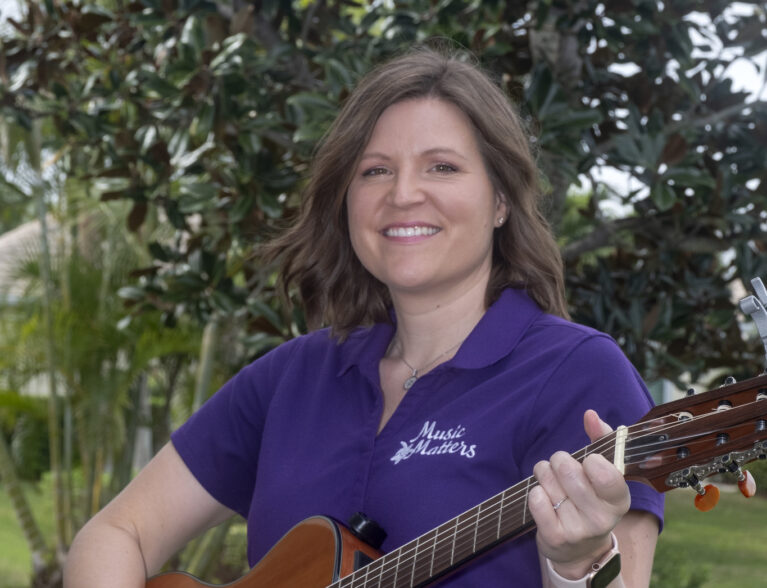
Have you ever heard a song on the radio that you hadn’t heard in decades, yet you were able to sing along, remembering every word of the lyrics? You probably wondered why you could remember the words but couldn’t remember what you did yesterday. There’s a reason for that. Music is a universal language that transcends boundaries, evokes memories, and impacts human emotions and well-being. The therapeutic potential of music continues to gain increasing attention, leading to expanded use of music therapy in healthcare.
“Music is stored in more than one place in the brain, so it’s easier to recall than where you put your keys,” explained Moreen Burkart, a board-certified music therapist who owns Music Matters LLC. “Research shows that music can activate areas of the brain that are responsible for memory, movement, language, attention and emotion and can be used for many therapeutic purposes.
“One reason music therapy is so effective is because our bodies are rhythmic – our breath is rhythmic, our brainwaves are rhythmic and even our walk is rhythmic,” Burkart continued. “There’s this thing called entrainment where two rhythmic bodies want to [get in sync]. Because of that, music can slow our heart rate, music can help us slow our breathing patterns and music can even affect our brainwaves.
“But it’s not just the rhythm that promotes healing. The tempo, or how fast or slow it is, can elicit different responses. If it’s upbeat and stimulating, we can get the patient more engaged. If we need to reduce anxiety, we use a slower tempo. With neurologic conditions the brain is impaired in some way. Music activates every part of the brain, so it helps to connect the dots.”
“Music therapy draws on the power of music in a therapeutic relationship to manage a range of conditions and improve your quality of life,” according to Cleveland Clinic. It can improve “mental, emotional, physical, social and cognitive wellbeing.”
References to music as a healing influence date back to the writings of Aristotle and Plato and throughout the 1800s. According to the American Music Therapy Association, the 20th century profession formally began after World War I when musicians visited veterans’ hospitals around the country to comfort those suffering from physical and emotional trauma. The soldiers seemed to improve both physically and emotionally, eventually prompting some hospitals to hire professionals for the job.
Music therapy has since evolved into an established profession in which music is used to address physical, emotional, cognitive and social needs of individuals. It can help patients with emotional trauma and physical pain or elevate their moods to feel more joyful or connected. That power still holds when dementia or brain damage strikes because music is processed through a different pathway than speech. Bypassing that pathway allows patients to better express themselves, communicate more clearly and experience the world more vibrantly.
As a music therapist, Burkart assesses the emotional and physical health, communication abilities, cognitive abilities and social skills of her clients through musical responses and creates musical sessions based on their needs. When there are physical symptoms, she focuses on how to improve, alleviate or provide more comfort with these systems.
“I ask them about their musical abilities and preferences and find out their strengths and their interests,” she said. “I find out what’s important to them. They may want to talk more clearly because their speech is deteriorating. So, we would do vocal intonation therapy and a lot of singing and motor respiratory control exercises because their goal is to be stronger with their speech.
“Another patient may want to walk with a steadier gait. Then we would use rhythm to help them pick up their feet. I tailor the treatment based on what is important to them. Because I am playing the guitar and singing, I can slow down or speed up the tempo and adapt the music to meet their needs. I’ve had patients in hospice who want to write a song to leave for their loved ones when they pass. There is no set curriculum. Each session is designed to help one specific individual.”
In general, music therapists work with all populations ranging from young children with special needs to elders in hospice care. The therapy can be practiced one on one or in group settings such as a hospital, correctional facility or nursing home. Group music therapy sessions foster social interaction and a sense of community and are particularly beneficial for individuals with autism or social anxiety as the sessions provide a structured and supportive environment.
Burkart spent the past 10 years working with seniors with neurologic conditions like Parkinson’s, Alzheimer’s and stroke, as well as those with chronic conditions like COPD, depression and anxiety. She visits her one-on-one clients in their homes where they can get undisturbed, individualized attention. She also offers both music therapy group programs and music enrichment groups at assisted care facilities. Her music therapy groups are limited to eight people so she can get to know each person better and document their progress. Music enrichment groups are open to all and are more of a fun community engagement session.
“I went into the health and service industry because I have a passion for making a difference in people’s lives,” Burkart said. “With my advanced training in rehabilitation, hospice, dementia and neurologic conditions, I am … equipped to advocate and provide services that will make a difference in their care. Seeing a patient’s eyes light up when they are moved by a song or melody warms my heart and is my greatest reward.”
Moreen Burkart is board-certified by the Certification Board for Musical Therapists as a neurologic music therapist and hospice and palliative music therapist. She received her music technology degree at Saint Mary’s University of Minnesota and her music therapy degree at Augsburg University. She is the owner of Music Matters LLC in Vero Beach. For more information: https://musicmatterstc.com/.



